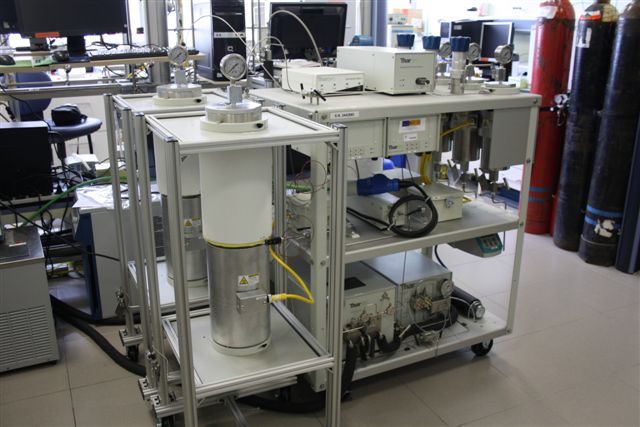The members of the research team are provided with remarkably furnished laboratories thanks to the funding received over the years through different calls:
- High pressure equipment: Thar Tech pilot plant model SAS 200; Thar Tech pilot plant model RESS 250; Thar Tech high-pressure reactor model R2502; Iberfluids high-pressure reactor; Iberfluids pilot plant model SAS; Iberfluids pilot plant model SS, Thar Tech impregnation cell with 100 mL agitation. This equipment will be used for the foaming and impregnation processes. Thar Tech SF5000 pilot plant; Thar Tech extraction plants of diverse capacity (100, 250, 500 mL, 1 and 2 L); Thar Tech SC fractionation column for liquid-fluid separation. This equipment will be used to produce the extracts. 300 mL Autoclave Engineers high pressure batch reactor with mechanical agitation, heating system, gas/steam injection, etc. This equipment will be used for the hydrothermal treatment of the polymers. All the above mentioned equipment operates under high pressure and temperature conditions and, therefore, the strictly required maintenance operations have been included in the economic report of this project.
- Analytical equipment: Gas Chromatograph (GC) Hewlett Packard, model HP6890, configured to analyze both liquids (FID detector) and gases (TCD detector) Spectrophotometer Shimadzu mini 1240 UV- visible; Liquid Chromatograph (HPLC) Hewlett Packard, model 1100; Mixed Chromatograph HPLC-UPLC, Multiplate Reader for the analysis of functional capacity (antimicrobial, antioxidant, antidiabetic, cytotoxic…) of the extracts and products generated; DT 828/1000 LH/HH Dissolution Tester, for the study of the release kinetics of the bioactive compounds in the impregnated polymers; TOC Analyzer Shimadzu TOC-5050, to determine the eventual partial hydrolysis of the polymers after hydrothermal treatments.
- Equipment for in vitro tests: laminar flow cabin, CO2 incubator, optical microscope and refrigerated spinner, among others.
For those analyses that may require any other equiment that is not readily available to the Research Team, the Central Services and/or the Peripheral Research Services of the University of Cadiz will be hired. If such local services could not provide the necessary equipment, the SCAI of another Andalusian university will be requested.
Finally, it should be noted that the project requires a high-pressure pump as inventory material. The number of tests to be carried out and the numerous high-pressure studies require numerous high-pressure pumps capable of pushing CO2-sc at the flows and pressures specified in the experimental design. Although the research team has already got a number of pumps that match these characteristics, it will be necessary to purchase one more pump to complete the equipment that is required to study the combined action of CO2-sc and co- solvents.


